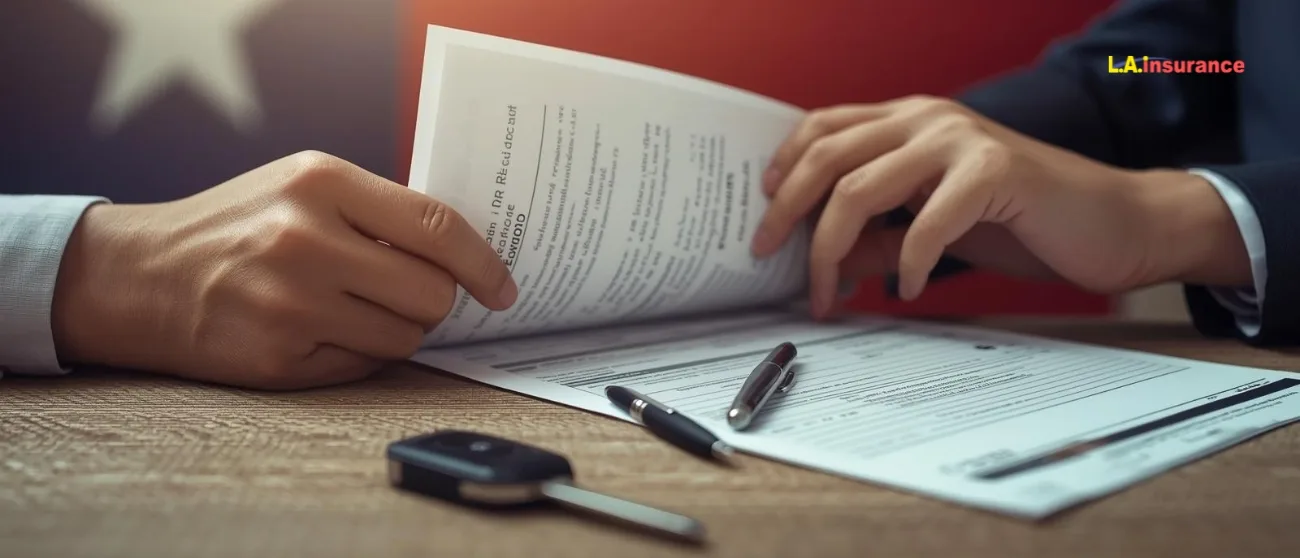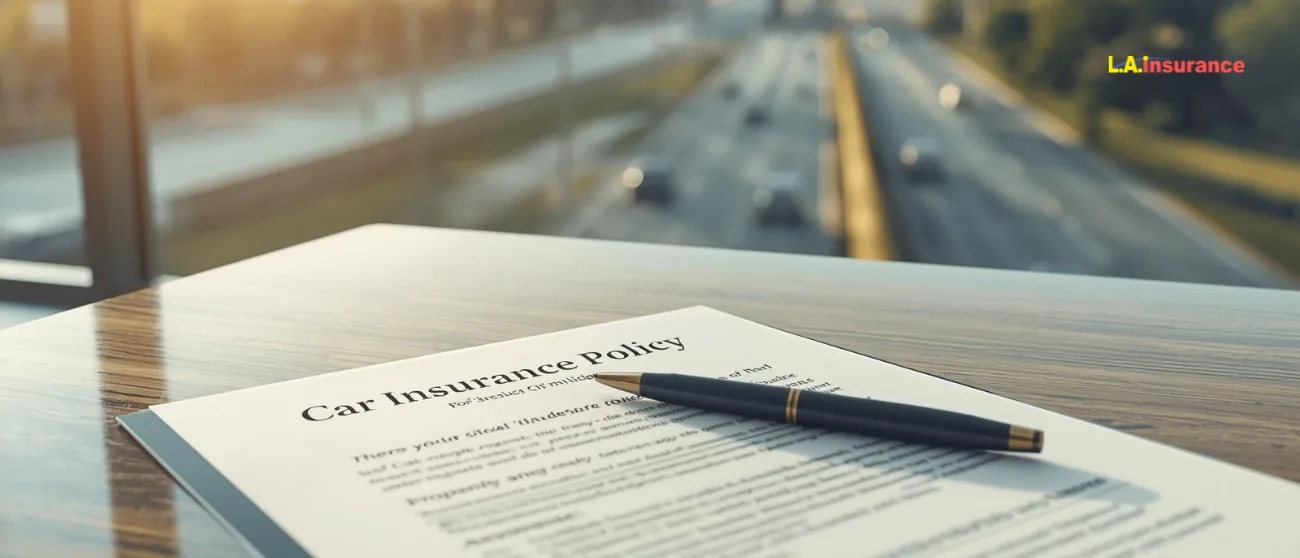
Publish Date: 19-11-2025
Auto Insurance
Can I Register a Car Without Insurance in Michigan?
If you’re thinking about registering a vehicle, the question that may come into your mind is do you need insurance to register a car in Michigan. The straightforward answer is NO. You must have proof of insurance to be legally registered. You can’t skip it. Without proof of insurance, don’t expect to register a car or even legally drive it. In case you’re pulled over and fail to show proof of insurance, it may result in a misdemeanor charge including fines, potential jail time, and license suspension.
In this article, we’ll cover what you need to register a vehicle in Michigan, why auto insurance matters, and the steps to get it. You’ll also learn about registration requirements, fees, and what happens if you’re caught driving without insurance.
Why Do You Need Michigan No-Fault Insurance for Registration?
As we said, you can’t register a car without insurance in Michigan. It’s not just a recommendation. It’s the law. You must show proof of Michigan No-Fault Insurance before your car can be legally registered.
Michigan’s no-fault insurance system makes each driver responsible for their own bodily injuries, property damage, and medical bills, regardless of who caused the accident. The intention here is to get covered quickly and reduce messy lawsuits over minor accidents.
Michigan no-fault insurance is a must-have legal requirement. Even if your car never leaves the driveway, as long as it’s being registered, it must be insured. And if you’re an out-of-state driver staying in Michigan for over 90 days, you’ll still need insurance even if your vehicle is already insured back home.
What You Need to Do to Register a Car in Michigan?
You can’t legally drive in Michigan unless your vehicle is properly registered. That’s the law. And it applies to everyone, whether you’re a new resident or just bought a used car. Here’s how to do it the right way:
1. Gather the Required Documents
Before heading to the Michigan Secretary of State, make sure you collect everything you’ll need:
- Proof of Michigan No-Fault Insurance
- Vehicle title (must be original not copy)
- Odometer reading (recorded on the title or separate form)
- Valid Michigan driver’s license or state-issued ID
- Proof of Michigan residency (e.g., utility bill, lease agreement)
- Payment for registration fees, sales tax, and title fees
- If applicable lien termination statement or authorization letter from a lender
- If transferring a plate, bring the old one
Pro Tip: If the car has an active loan, bring written authorization from your insurance company or lienholder.
2. Verify and Record the Odometer Reading
The odometer reading confirms the vehicle’s mileage. It’s also legally required for title transfer. If your title doesn’t have space, use an Odometer Mileage Statement. This will prevent fraud and protect buyers, sellers, and future owners.
3. Transfer the Vehicle Title
If you’re buying from a private party, the vehicle title must be transferred to your name. This proves ownership.
Steps:
- Make sure both seller and buyer sign the title
- Ensure the odometer reading is correctly written.
- If seller can’t come, use the Appointment of Agent form.
- Pay the title fees ($15 standard; $15 late fee if delayed beyond 15 days)
Please keep in mind that if you’re transferring the title online, both parties must have valid Michigan IDs, and the vehicle must meet online eligibility.
Learn More: Can I Buy a Car Without a License?
4. Visit the Secretary of State Office (or Check If You Can Do It Online)
Not everything can be done online. In fact, most vehicle registrations happen at a Secretary of State office.
Pro Tip: Appointments are highly recommended to avoid long waits. You can schedule an office visit online through the Michigan Department of State website.
Please note that for online transfer you’ll need the following:
- A paper Michigan title (not electronic)
- A clean sale from one private owner to another
- No financing or lien on the vehicle
- Uploads of the front and back of the title
- Proof of insurance
Fact: If eligible, you’ll receive a 60-day temporary license plate once approved.
5. Pay the Required Fees
You’ll have to pay a combination of fees based on the vehicle type, sale type, and plate situation. Fees usually include (subject to change):
- $15 title fee
- $10-$15 plate transfer fee
- 6% sales tax (if not a close family member sale such as a spouse, parent, siblings)
- Optional Recreation Passport ($14 -$28, depending on vehicle type)
- Late of $15 if title isn’t transferred within 15 days.
Of note, payment can be made via cash, card, check, or money order. If you pay online, it may include extra processing fees.
Learn More: How to Sell a Car in Michigan?
6. VIN Verification (Only If Required)
If your car is from another state, you might be asked to verify your vehicle identification number (VIN). You can do it at an SOS office or certified repair shop. It ensures that the motor vehicle hasn’t been tampered with and matches all records.
7. Keep Your Insurance and Registration Handy
Once registered, keep both your registration document and insurance card in the vehicle at all times. Law enforcement/traffic police will ask for them if you’re pulled over or in an accident.
Learn More: Can I Get Car Insurance Without a License?
Steps to Get Michigan’s No-Fault Auto Insurance
Like most states, minimum liability auto insurance is mandatory in Michigan. However, it’s a no-fault insurance state which means you’ll get covered regardless of fault. Since without car insurance, you’re not eligible to register your vehicle, you should secure one as soon as you purchase a vehicle. Here’s how you can easily secure Michigan’s no-fault car insurance:
1. Start with Research
Don’t jump in blindly. Every insurance company offers different rates and coverage.
- Look for providers approved to sell auto insurance in Michigan
- Compare prices but also compare reliability.
- Read reviews and consider what other drivers have to say.
2. Choose the Right Coverage
Make sure the insurance policy meets all Michigan law requirements. Without that, your vehicle registration won’t go through.
Here's how much insurance you’ll need to meet the registration requirements in Michigan:
- $50,000 for bodily injuries per person.
- $100,000 for bodily injuries per accident.
- $10,000 for property damage (out of state).
- Unlimited Personal Injury Protection (PIP)
- $1 million in property protection insurance (covers Michigan-only property damage)
If you need affordable full coverage auto insurance to meet legal requirements in Michigan as well as to protect your vehicle in every way possible, contact L.A. Insurance. The nation’s most affordable insurance agency won’t disappoint you when it comes to reliable coverage and cheaper prices. We’ve been offering cheap insurance in Michigan for more than 33 years which makes us proud as a carrier. Contact us online or find an agent to talk about your insurance needs.
Learn More: Michigan Auto Insurance Requirements
3. Ask About Discounts
There’s no doubt car insurance rates in Michigan can be pricey. But you shouldn’t overpay and take advantage of discounts that most insurers offer, such as:
- Bundling policies with life insurance, home insurance, or renter’s insurance
- Good driving history
- College students with good grades
- Anti-theft devices on your vehicle
Never hesitate to ask for ways to lower your car insurance rate to your insurer.
4. Buy the Policy and Get Proof of Insurance
Once you’ve chosen your auto insurance policy, purchase it. After that, your provider will give you proof of insurance.
Accepted forms of proof include:
- Digital insurance card (app or pdf)
- Paper card mailed to you
- Declaration page showing coverage, policy number, and start date
Reminder: Keep a copy in your glove box. And one on your phone. You’ll need it for registration and if pulled over by police.
Learn More: Why Is Michigan Auto Insurance So Expensive?
5. Keep It Active
When it comes to obtaining an insurance policy for your vehicle in Michigan, our final reminder is to always keep your policy active.
- Set reminder for renewal
- Don’t let it lapse
- If you change insurance companies, update your proof immediately
Caution: A car insurance lapse grace period is usually between 10 to 20 days. Make sure to renew it on time. A lapse could make you financially vulnerable on the road if you are involved in an accident. Plus, this can potentially increase your future auto insurance rate.
Learn More: What to Do If You Can’t Afford Car Insurance?
Consequence of Not Having Car Insurance in Michigan
So what happens if you don’t carry the minimum required auto insurance in the Great Lake State? Will it just prevent you from registering your vehicle? Not really. The consequences are much worse than that. Here are the common ramifications you might face if you’re found without insurance in Michigan state:
- You can’t register a vehicle without proof of Michigan No-Fault insurance.
- Driving without insurance is a misdemeanor under Michigan law.
- You could face a fine up to $500.
- You could be jailed for up to 1 year.
- Your driver’s license may be suspended for 30 days or more. If suspended, learn whether can you get auto insurance with a suspended license.
- Your vehicle registration could be revoked or suspended.
- You risk civil lawsuits if you cause an accident.
- You may lose your right to sue for pain and suffering in case you’re a victim of an accident.
- You’ll be 100% responsible for property damage, and bodily injuries (as you don’t have PIP).
- You can’t file a mini tort claim for your vehicle damage.
- A lapse in coverage can lead to higher future premiums.
- In a worst-case scenario you might have to file an SR-22 form (proof of financial responsibility)
- If cited, you’ll pay a $25 fee even with late proof shown in court.
Learn More: What Happens If You Don’t Have Car Insurance?
Recap: Can I Register a Car Without Insurance in Michigan?
To sum up, you cannot register a vehicle if you don’t have car insurance in Michigan. Whether you choose to do it online or by visiting the SOS office, you have to have proof of insurance. The car registration process is simple and won’t take you too much time if you have the right documents along with Michigan’s no-fault insurance.
We recommend gathering all the things you need such as vehicle ownership, proof of residency, a valid driver’s license, and registration fees before arriving at the Michigan Secretary of State office.
Also, if you're securing auto insurance in Michigan and encounter any difficulties, feel free to contact us. Moreover, if you're considering changing your current insurance company before registration, we'd be happy to discuss your options.
Related FAQs on Registering a Vehicle Without Insurance in Michigan
Just bought a car - how long can I drive without registration in Michigan?
According to the Michigan Department of State, you have 3 days to drive the car home. You must carry the title, proof of insurance, and a valid license.
Can I register a car in Michigan with an out-of-state license?
Yes. You can register a car in Michigan with an out-of-state license. However, you must produce certain documentation including vehicle ownership, proof of insurance, and your out-of-state license.
Can you transfer a title online in Michigan?
Yes, but the transfer must be between two individuals. Both the seller and the buyer must have a valid Michigan driver's license and meet other online requirements.
Can I register a vehicle if the insurance is not in my name?
Yes. In Michigan registration and insurance can be done under two different names. However, the insurance company can introduce specific conditions.
Do I need proof of insurance to transfer a title in Michigan?
Yes. It is a must to show proof of Michigan No-Fault insurance to transfer a title and register a vehicle.
How to transfer a car title to a family member in Michigan?
Visit a Secretary of State office with the title, ID, and proof of insurance. Sales tax is waived for immediate family.
Editorial Disclaimer
The information provided on this blog is for general informational purposes only and does not constitute professional insurance, legal, or financial advice. Coverage and rates are subject to individual eligibility, underwriting guidelines, and state availability. For specific questions regarding your policy or to get an accurate quote, please contact a licensed L.A. Insurance agent directly. We're an independent agency and not a direct insurance carrier. For more information on how we operate and handle your data, please see our Terms and Conditions and Privacy Policy.
Tag :
Auto insurance








